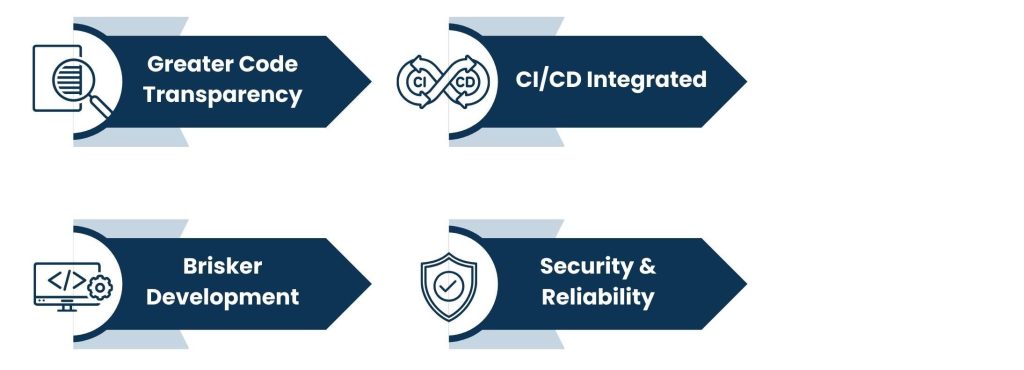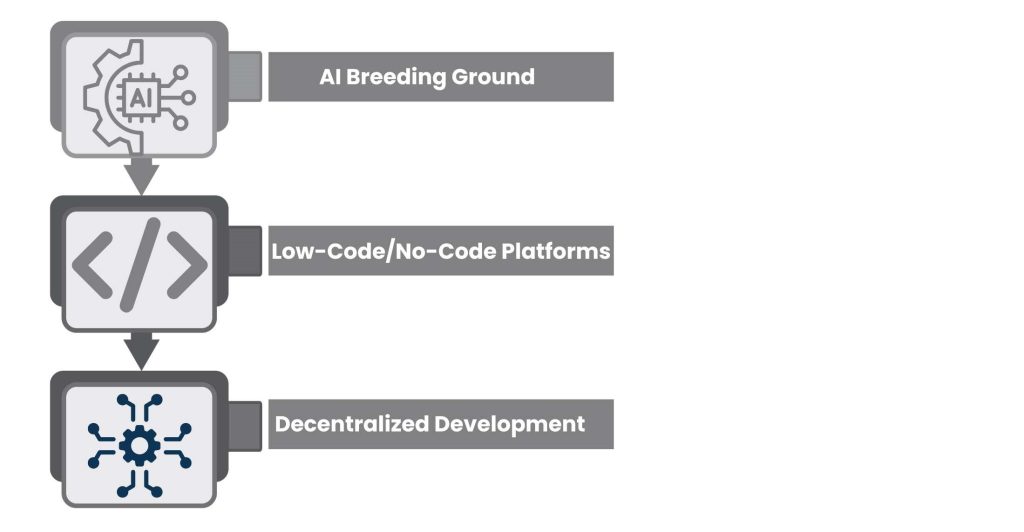Introduction
Software has shifted from isolated work products to collaborative programming. Developers in different time zones and companies are working together to build advanced applications. Center to this transition is Co-Development Software — the platforms that enable teams to collaborate, share code, and manage the development workflow in real-time. Whether you are building the next great open-source project or working on a global enterprise team, co-development tooling is a must.
So, what is Co-Development Software exactly, and why has it become so significant in the modern world of rapid software development? Let’s break it down.
What is Co-Development Software?
Co-development software is a tool or application that supports collaboration between teams of software developers. These tools facilitate real-time collaboration, code sharing, version management, and workflow automation. Co-development software helps everyone stay in alignment and productive, whether your team is in your area or scattered across continents.

Important Factors of The Co-Development Software:
- Version Control Systems: Tools such as Git, GitHub, and GitLab enable teams to track changes, manage branches, and work together on code.
- Live Coding Platforms: IDEs like Visual Studio Live Share or CodeSandbox allow for collaboration and debugging.
- Issue Tracking & Project Management Tools: Jira, Trello, and Asana help teams organize tasks, track bugs, manage sprints, etc.
- CI/CD Automation: Depending on tools like Jenkins, CircleCI, and GitHub Actions allows for the automation of testing and deployments, reduces errors, and speeds up release cycles.
- Security & Compliance Management: Tools such as SonarQube and Codacy enforce coding standards and help in maintaining regulatory compliance.
These characteristics allow teams to develop their software faster, with more quality, and with fewer blockers.
Impact on Open Source Projects
Open-source software is based on collaboration. Developers from different backgrounds and locations contribute to codes, fix bugs, and enhance features. This is where Co-Development Software comes in — delivering the framework, visibility, and tools necessary to keep community-led efforts productive and sustainable.

1. Greater Code Transparency
Platforms like GitHub open codebases to the public, allowing anyone to review, fork, and pay it forward. Transparent workflows allow for peer reviews, audit trails, and open discussions around every code change. It assures the quality of the code while cultivating trust and accountability.
2. Brisker Development
With contributors working on various features in parallel, progress is distributed and faster. In the case of co-development platforms, these contributions are managed using branching and merging that is so effective with some processes that conflicts are minimal and enable continuous progress in even large communities.
3. CI/CD Integrated
Each CI pipeline runs automated tests of the CI/CD before the new change is merged, and the compatibility will be checked. It helps maintain a high-quality codebase for a high update rate, reducing bugs in production significantly.
4. Security & Reliability
It’s an open-source project with many eyes on the code. Vulnerabilities are detected sooner and fixed faster. SonarQube and other tools automate security checks and coding conventions to help make open-source software solid.
Using Co-Development Software, open-source communities can sustain a rapid pace of development without compromising quality, transparency, or security. It’s a fundamental part of how contemporary open-source projects grow, scale, and flourish.
Backing Corporate Initiatives
Enterprises rely on various software, and managing large teams worldwide increases complexity. Co-development software to the rescue, helping enterprises cross the obstacles through great differentiated means, Providing the infrastructure required to fix quality and speed at scale.

1. Increasing the Productiveness of Groups
Cloud options corresponding to GitHub Enterprise and Azure DevOps allow distributed groups to work within identical codebases in real time. These tools allow for contributions to be made asynchronously, minimize unnecessary back-and-forth email chains, and maintain alignment as everyone works to shared workflows and automation.
2. Applying Code Quality & Compliance
Best practices are enforced across teams using tools such as SonarLint and Codacy. Additionally, these platforms include built-in checks to assist teams in complying with key industry regulations, including GDPR, HIPAA, and ISO 27001, that are necessary in industries like healthcare, finance, and SaaS.
3. Speeding Up Deployment
CI/CD pipelines can perform the testing and deployment activities that, if done manually, can take a lot of time. They enable fast prototyping, faster QA feedback, and feature handling. This helps you to create an agile, responsive development environment that fosters innovation.
These tools also decrease the reliance on manual coordination so that developers can focus on higher-value activities. Co-development tools aren’t just useful for enterprises deploying complex, multi-team projects — they’re mission-critical assets that promote cross-functional collaboration, improve code reliability, and speed up delivery cycles.
The Importance of Co-Development Software for Businesses
The advantages of using Co-Development Software go far beyond just convenience. For contemporary enterprises facing fast-paced development lifecycles, decentralized groups, and increasing consumer expectations, these instruments deliver a vital basis for sustainable progress and revolutions.

1. Improved Development Speed
Developers can code reviews and merge changes without waiting. Shared workspaces, live editing, and synchronized updates allow teams to stay on track whether they’re day or night.
2. Improved Code Quality
Thanks to peer review systems and automated testing pipelines that are built in, the code quality is significantly higher. It minimizes faulty deployments and improves user experience by catching bugs at an early stage.
3. Cost savings
Co-development software allows teams to work with open-source tools and cloud-based infrastructures, avoiding costly licenses and hardware dependencies. It also reduces time-to-market, which, in turn, saves time and development costs.
4. Enhanced Security & Compliance
Obvious in-built features like vulnerability scanning, access control, and compliance monitoring assist organizations in achieving regulatory standards such as GDPR or HIPAA. This reduces the risk of incurring fines or suffering a data breach and engenders customer trust.
5. Remote Work
Co-development applications make working together from afar a cinch. Much more than a text message, integrated communication platforms such as Slack and Teams, along with collaborative IDEs and project boards, enable teams to function effectively all over the world.
However, these benefits combined enable businesses to keep innovating at speed, uphold quality, and scale effectively. For companies across the scale,Co-Development Software has become an integral part of digital strategy.
How to Select the Right Co-Development Software
These tools do not fit all use cases. Choosing the right co-development software depends on your project size, team structure, regulatory requirements, and overall development objectives. Choosing wisely allows your team to operate efficiently, securely, and scalably.

For Open Source Projects:
- When possible, prefer tools that facilitate public repositories and community contributions (GitHub, GitLab, Bitbucket). It makes it visible and accessible to contributors worldwide and allows seamless community participation and public.
- Seek strong issue-tracking and collaborative review features. Open-source projects depend on peer contributions and feedback. It’s important to have a systematic system to track bugs, feature requests and merge pull requests, which helps keep the project in good condition.
- Have decent docs and community support. Contributors depend on well-developed READMEs, wikis, and help forums. Onboarding and knowledge-sharing tools enable more developers to contribute easily.
For Enterprise Projects:
- Choose solutions that allow the creation and management of access control, audit logs, and compliance features. Unless you’ve been living under a rock, you know that enterprises are governed by stringent regulations, so controlling who can access code and tracking all changes is essential for compliance.
- Protect proprietary code with private repositories. Sensitive IP should not be shared with the outside world, especially when using contractors or word with third-party vendors.
- Seek integration with DevOps tools to enable automation. Integrating your co-development platform with CI/CD, testing tools, and monitoring systems allows for a more seamless development and deployment process.
Also, think about scalability and user management. Do you want the tool to serve multiple teams in different locations? Does it support role-based access and project-based permissions? Answers to these questions can impact long-term success and operating efficiency.
| Tools | Best for | Key Features |
|---|---|---|
| GitHub | Open-source & enterprise | Version control, issue tracking, CI/CD |
| GitLab | Security-focused DevOps teams | Integrated CI/CD, code scanning |
| Bitbucket | Small-to-mid business repos | Jira integration, private repos |
| Jenkins | CI/CD automation | Highly customizable pipelines |
| Azure DevOps | Large-scale enterprise projects | Agile workflows, cloud, and tool integration |
| Jira | Team coordination and task tracking | Sprint planning, workflows, custom boards |
The Future of Co-Development Software
As teams become more distributed and development cycles become shorter, co-development tools continue to evolve at a fast speed. Innovation in this space is being driven by the need for more efficient, intelligent, and inclusive practices in software development. As businesses grow, we expect Co-Development Software to become increasingly essential as teams are diversified and the focus on security and compliance intensifies.

1. AI Breeding Ground
The evolution of artificial intelligence will change the way we write and manage code. The platform promises more intelligent code suggestions, automated debugging, predictive testing, and documentation on the fly. AI is also capable of analyzing historical commit data to identify trends and optimize workflows across teams.
2. Low-Code/No-Code Platforms
Low-code/no-code platforms are paving the way for non-technical stakeholders to be more involved in product development directly. Designers, analysts, and even business users can create working components or automate workflows without traditional coding, embracing a wider culture of collaboration.
3. Decentralized Development
Blockchain-based development environments are promising transparent version control and contributor authentication. This has a potential for revolutionary change for open-source communities since it enables trustless collaboration, immutable audit trails, and better ownership tracking of code.
On top of all this, we will also begin to see improved integrations with DevOps pipelines, additional support for hybrid and remote teams, and platform-agnostic development environments that simplify cross-team endeavors. The future is collaborative, intelligent, and decentralized — and at the heart of it all is Co-Development Software.
Conclusion
Co-development software is transforming the way software is built. Whether you’re running an open-source project or leading a cross-functional enterprise team, these tools offer:
- Development speed increases via immediate cooperation.
- Automated security and code quality improvements.
- Deployment is cheaper with cloud-native infrastructure.
- Built-in governance tools that provide compliance support.
Discover the best Co-Development Software solution if your team is moving faster, building smarter, and collaborating better.
About Us
Tasks Expert offers top-tier virtual assistant services from highly skilled professionals based in India. Our VAs handle a wide range of tasks, from part time personal assistant to specialized services like remote it support services, professional bookkeeping service etc. Furthermore, it helps businesses worldwide streamline operations and boost productivity.
Ready to elevate your business? Book a Call and let Tasks Expert take care of the rest.










